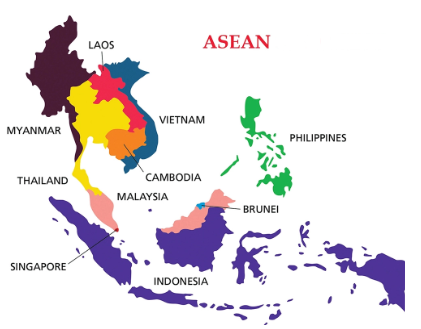11 Nov 2024 13:05:17 pm
International Relations
Association of Southeast Asian Nations (ASEAN)
Tags :
Association of Southeast Asian Nations (ASEAN)

Topic: Multilateral Organizations
Why in the news?
- Myanmar will send a Foreign Ministry official as its representative to the Association of Southeast Asian Nations (ASEAN) summit this week for the first time in three years, as the junta struggles to quell a civil war.
- ASEAN had barred Myanmar\'s junta leaders from its summits in the wake of their February 2021 coup.
Source: The Hindu
About Association of Southeast Asian Nations (ASEAN):
- It is a regional grouping that aims to promote economic and security cooperation among its ten members: Brunei, Cambodia, Indonesia, Laos, Malaysia, Myanmar, the Philippines, Singapore, Thailand, and Vietnam.
- It was established on 8 August 1967 in Bangkok, Thailand, with the signing of the ASEAN Declaration (Bangkok Declaration) by the founding fathers of ASEAN: Indonesia, Malaysia, Philippines, Singapore and Thailand.
- The motto of ASEAN is “One Vision, One Identity, One Community”.
- Its secretariat is located in Jakarta, Indonesia.
- Fundamental principles of ASEAN are:
- Mutual respect for the independence, sovereignty, equality, territorial integrity, and national identity of all nations.
- The right of every State to lead its national existence free from external interference, subversion, or coercion.
- Non-interference in the internal affairs of one another.
- Settlement of differences or disputes in a peaceful manner.
- Renunciation of the threat or use of force.
- Effective cooperation among themselves.
- Strengths of ASEAN as a regional grouping:
- Regional stability: ASEAN has played a significant role in promoting peace and stability in the region, including through the signing of the TAC and the ARF.
- Economic growth: ASEAN has a combined population of more than 630 million people (2021) and a growing middle class, making it a dynamic and rapidly expanding market for trade and investment.
- It is a major hub of manufacturing and trade.
- It is the 4th largest exporter in world trade.
- Cultural diversity: ASEAN is home to a rich and diverse range of cultures, languages, and religions, which creates opportunities for cross-cultural exchange and cooperation.
- Strategic location: ASEAN is strategically located at the crossroads of major trade routes, making it an important hub for trade and commerce.
- Example: Strait of Malacca, which is a key shipping route for world trade.
- Diplomatic engagement: ASEAN has free trade agreements (FTAs) with a number of countries like India, Japan, New Zealand, China, South Korea, etc.
- Significance of ASEAN for India:
- It constitutes the 3rd largest market in the world. This can help India utilize its export potential.
- It is a crucial component of India\'s \"Act East\" policy and its \"Indo-Pacific\" strategy, reflecting the convergence of interests in the region.
- Strengthening relations with ASEAN countries can serve as a counterbalance to China\'s influence in the region.
- Connectivity initiatives with ASEAN can boost economic development in India\'s northeastern states by positioning them as a hub for regional trade and commerce.
- It plays a central role in promoting a rules-based security architecture in the Indo-Pacific region, which is essential for the region\'s stability and prosperity.

